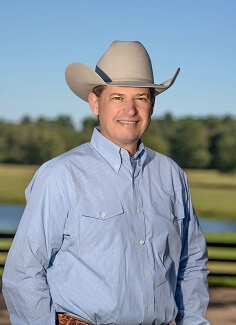by Carl Ray Polk Jr., Texas & Southwestern Cattle Raisers Association first vice president

It is simply impossible to raise cattle without developing a deep connection to the land that nourishes our livestock and families.
Recently, I’ve heard increased concerns from property owners about the future of this land. Development is ever-expanding, and we must contend with condemnations to build infrastructure going to and from large metropolitan areas. Governments continually seek more regulation over private lands, and land prices are rising.
These pressures are especially evident in Texas, where more than 1,000 people are added to the population each day.
Working lands are essential not only for our livelihoods as farmers and ranchers, but also to every American. They grow crops and livestock that turn into a diverse array of food, clothes, shelter, energy and products that make modern life possible. They recharge our aquifers, lakes and rivers that provide our water. They support our wildlife and pollinators, provide recreation and open space, and soak up floodwaters, air pollutants and greenhouse gases.
Yet, with exploding populations, our working lands are developed, subdivided and converted to other uses diminishing these benefits. As a result, it is harder for cattle raisers to find affordable rangeland for livestock. The prospect of new government regulations also creates new challenges and drives up costs.
Texas & Southwestern Cattle Raisers Association has always been at the forefront of these issues, fighting to preserve your ability to raise cattle. Our job will only become more critical as time goes on.
One of the most important factors in keeping working land affordable is maintaining Texas’ agricultural appraisal system. This ensures you will not be forced off your property because of sky-high property values in surrounding communities driving up your property tax bill. We have fought vehemently to preserve this vital tool against challenges from revenue-hungry appraisal districts — and will continue to do so.
For decades, we have also fought regulatory abuse at every level of government. Many federal efforts are well known, such as their recent attempts to revive an overreaching Waters of the United States definition, to list new endangered species and to require reporting of carbon emissions from cattle.
Others, however, are less well known. For example, during the latest Texas Legislative Session, legislation was introduced to implement a Wildland-Urban Interface Code allowing counties to regulate how you build your barns, improve your property and even stack your hay bales. Fortunately, our government relations staff found the bill and ensured it did not pass.
Still, new challenges emerge almost daily and from every direction. Especially as preparations begin ahead of the 2023 Texas Legislative Session, we expect to work on a variety of other emerging land-use issues.
Since our inception, private property rights and land-use issues have been a priority for the Texas & Southwestern Cattle Raisers Association. We will always strive to balance your right to convey your property as you choose with the necessity of preserving working lands for future generations. Rest assured, these concerns will continue to take center stage at the Texas & Southwestern Cattle Raisers Association.
###
